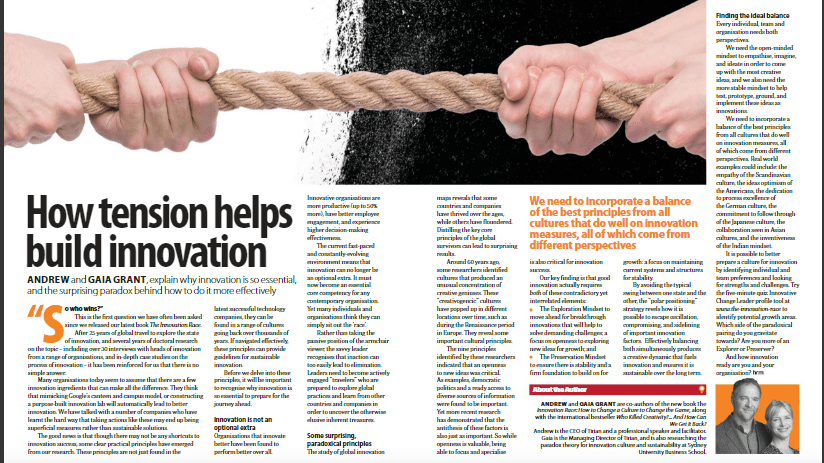ANDREW and GAIA GRANT explain why innovation is so essential, and the surprising paradox behind how to do it more effectively.
“who wins?” This is the first question we have often been asked since we released our latest book The Innovation Race.
After 25 years of global travel to explore the state of innovation, and several years of doctoral research on the topic – including over 30 interviews with heads of innovation from a range of organisations, and in-depth case studies on the process of innovation – it has been reinforced for us that there is no simple answer. Many organisations today seem to assume that there are a few innovation ingredients that can make all the difference. They think that mimicking Google’s canteen and campus model, or constructing a purpose-built innovation lab will automatically lead to better innovation. We have talked with a number of companies who have learnt the hard way that taking actions like these may end up being superficial measures rather than sustainable solutions.
The good news is that though there may not be any shortcuts to innovation success, Some clear practical principles have emerged from our research. These principles are not just found in the latest successful technology companies, they can be found in a range of cultures going back over thousands of years. If navigated effectively, these principles can provide guidelines for sustainable innovation.
Before we delve into these principles, it will be important to recognize why innovation is so essential to prepare for the journey ahead.
Innovation is not an optional extra
Organisations that innovate better have been found to perform better overall.
Innovative organisations are more productive (up to 50% more), have better employee engagement, and experience higher decision-making effectiveness. The current fast-paced and constantly-evolving environment means that innovation can no longer be an optional extra. It must now become an essential core competency for any contemporary organisation. Yet many individuals and organisations think they can simply sit out the race. Rather than taking the passive position of the armchair viewer, the savvy leader recognizes that inaction can too easily lead to elimination. Leaders need to become actively engaged “travelers” Who are prepared to explore global practices and learn from other countries and companies in order to uncover the otherwise elusive inherent treasures.
Some surprising, paradoxical principles
The study of global innovation maps reveals that some countries and companies have thrived over the ages, while others have floundered. Distilling the key core principles of the global survivors can lead to surprising results.
Around 60 years ago, Some researchers identified cultures that produced an unusual concentration of creative geniuses. These “creativogencic” cultures have popped up in different locations over time, such as during the Renaissance period in Europe. They reveal some important cultural principles.
The nine principles identified by these researchers indicated that an openness to new ideas was critical. As examples, democratic politics and a ready access to diverse sources of information Were found to be important. Yet more recent research has demonstrated that the antithesis of these factors is also just as important. So while openness is valuable, being able to focus and specialize
We need to incorporate a balance of the best principles from all cultures that do well on innovation measures, all of which come from different perspectives
The magazine full article can be read on Human Resources Asia ISSUU here >

Gaia Grant (PhD) is a lecturer and researcher at the University of Sydney Business School in the Discipline of Strategy, Innovation and Entrepreneurship, focusing on research into innovation paradoxes and ambidextrous leadership. Gaia is also a Director of Tirian International Consulting, the co-author (with Andrew Grant) of a number of books including ‘The Innovation Race’, and “Who Killed Creativity?”.


